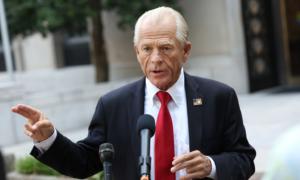Former Trump adviser was sentenced in January to four months for contempt of Congress after refusing to comply with a subpoena from the House Jan. 6 Committee.
Former White House adviser Peter Navarro has been ordered to report to a Miami prison on March 19, his attorney revealed in a filing requesting release.
U.S. District Judge Amit Mehta had denied Mr. Navarro’s prior request for release pending appeal but the former White House adviser raised the issue to the appellate level.
Mr. Navarro received a four-month sentence in January for contempt of Congress after he refused to comply with a subpoena from the House Jan. 6 Committee.
“For the first time in history, a senior presidential advisor has been convicted of contempt of congress after asserting executive privilege over a congressional subpoena,” the March 10 filing read.
“Dr. Navarro has appealed and will raise a number of issues on appeal that he contends are likely to result in the reversal of his conviction, or a new trial.”
The filing stated that Mr. Navarro was “to report to the custody of the Bureau of Prisons, FCI Miami, on or before 2:00 p.m. EDT on March 19, 2024.”
The recent filing came as part of his request that the U.S. Court of Appeals for the D.C. Circuit grant him a stay for his sentence pending an appeal.
Mr. Navarro has said that he believes his case will reach the Supreme Court. He indicated as much in his recent filing, which read: “Should this Court deny Dr. Navarro’s motion, he respectfully requests an administrative stay so as to permit the Supreme Court review of this Court’s denial.”
Three circuit judges requested on Feb. 23 that the Justice Department (DOJ) respond to Mr. Navarro’s request. In a March 4 filing, DOJ argued that his arguments were “unfounded” and the court should reject his request for a stay.
Executive Privilege
Mr. Navarro defended himself by arguing that President Trump had extended executive privilege in a way that allowed him to avoid complying with Congress’ requests.
“Dr. Navarro’s actions do not stem from a disrespect for the law, nor do they stem from any belief that he is above the law,” his sentencing memo read.
“Rather, Dr. Navarro acted because he reasonably believed he was duty-bound to assert executive privilege on former President Trump’s behalf.”
Besides Mr. Navarro’s case, the D.C. Circuit is considering a similar appeal from former Trump adviser Steve Bannon. Mr. Bannon also received a four-month sentence for contempt of Congress after he refused to comply with a committee subpoena.
In Mr. Bannon’s case, his attorney argued that shouldn’t be held liable for following instructions from his own attorney when he was subpoenaed. Both he and Mr. Navarro contended that lower courts wrongly prevented the defense from presenting certain evidence.
In an emergency motion on Feb. 23, Mr. Navarro’s attorney argued that “the district court precluded Dr. Navarro from presenting any evidence in his defense explaining that even though he did default on the subpoena, he felt, as the district court found, duty-bound to assert executive privilege; while simultaneously permitting the government to tell the jury that Dr. Navarro’s assertion of executive privilege unequivocally did not excuse him from complying with the subpoena and his failure to do so put him, ‘above the law,’” the motion read. (emphases from Mr. Navarro’s attorney)
DOJ’s response echoed Judge Mehta’s claim that Mr. Navarro hadn’t provided sufficient evidence to the court that President Trump invoked executive privilege.
Original News Source Link – Epoch Times
Running For Office? Conservative Campaign Consulting – Election Day Strategies!


